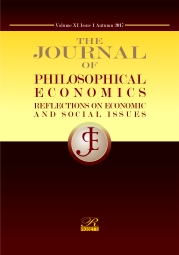The Hegelian dialectics of global imbalances
The Hegelian dialectics of global imbalances
Author(s): Célestin MongaSubject(s): Philosophy, Social Sciences, Economy, Special Branches of Philosophy, Sociology, Philosophy of Science, Social Theory, Socio-Economic Research
Published by: Editura Rosetti International
Keywords: global imbalances; Lucas Paradox; twin-deficit hypothesis; Nash equilibrium; dynamics of self-consciousness
Summary/Abstract: Traditional narratives of external imbalances have focused on the analysis of national accounts, trade flows, and financial flows. They have generated two opposing views of the current situation of the world economy: on one side, a prudent, if not pessimistic view considers large imbalances as evidence of problems with the international monetary and financial system, and symptoms of domestic distortions (mainly in the United States and China). On the other side, a relaxed, if not optimistic view suggests that global imbalances are not anomalies but simply the predictable outcome of a world with increasingly globalized financial flows in search of the right mix of risks and returns. This paper offers a critical analysis of these competing explanations of the United States-China imbalances and suggests a way of reconciling them. The paper uses Hegel’s parable of the development of self-consciousness to explain the dynamics between the two countries. Hegel may not have been a great philosopher of history but his study of lordship and bondage provides a good framework for analyzing the dialectics of recognition and acknowledgement that currently characterizes the macroeconomic relationships between the United States and China.
Journal: Journal of Philosophical Economics
- Issue Year: VI/2012
- Issue No: 1
- Page Range: 2-51
- Page Count: 50
- Language: English

